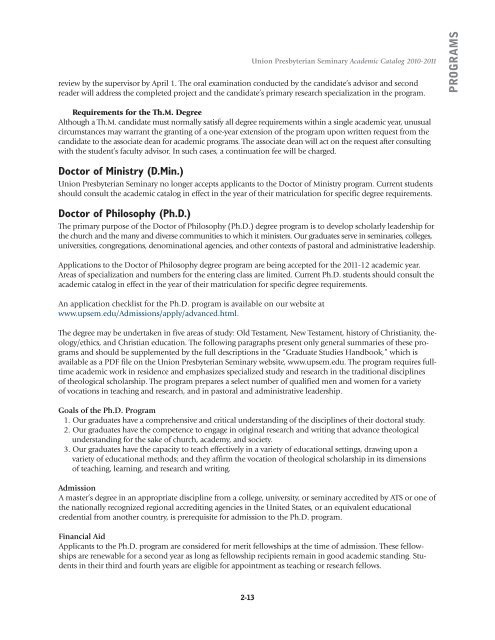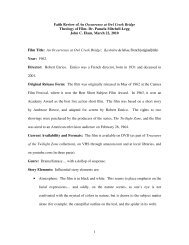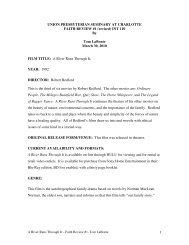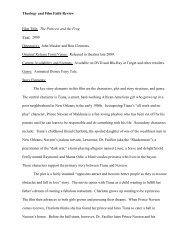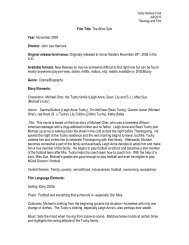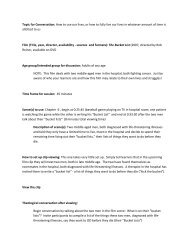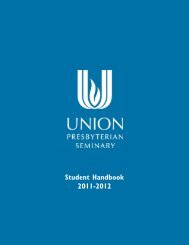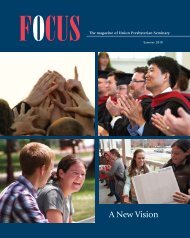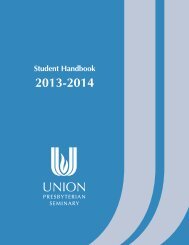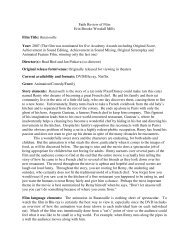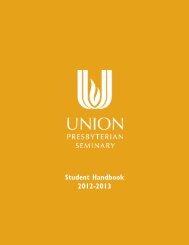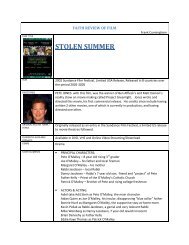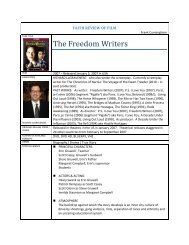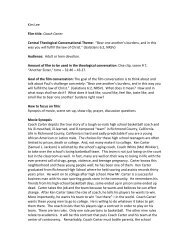Academic Catalog 2010-2011 - Union Presbyterian Seminary
Academic Catalog 2010-2011 - Union Presbyterian Seminary
Academic Catalog 2010-2011 - Union Presbyterian Seminary
You also want an ePaper? Increase the reach of your titles
YUMPU automatically turns print PDFs into web optimized ePapers that Google loves.
<strong>Union</strong> <strong>Presbyterian</strong> <strong>Seminary</strong> <strong>Academic</strong> <strong>Catalog</strong> <strong>2010</strong>-<strong>2011</strong>review by the supervisor by April 1. The oral examination conducted by the candidate’s advisor and secondreader will address the completed project and the candidate’s primary research specialization in the program.PROGRAMSRequirements for the Th.M. DegreeAlthough a Th.M. candidate must normally satisfy all degree requirements within a single academic year, unusualcircumstances may warrant the granting of a one-year extension of the program upon written request from thecandidate to the associate dean for academic programs. The associate dean will act on the request after consultingwith the student’s faculty advisor. In such cases, a continuation fee will be charged.Doctor of Ministry (D.Min.)<strong>Union</strong> <strong>Presbyterian</strong> <strong>Seminary</strong> no longer accepts applicants to the Doctor of Ministry program. Current studentsshould consult the academic catalog in effect in the year of their matriculation for specific degree requirements.Doctor of Philosophy (Ph.D.)The primary purpose of the Doctor of Philosophy (Ph.D.) degree program is to develop scholarly leadership forthe church and the many and diverse communities to which it ministers. Our graduates serve in seminaries, colleges,universities, congregations, denominational agencies, and other contexts of pastoral and administrative leadership.Applications to the Doctor of Philosophy degree program are being accepted for the <strong>2011</strong>-12 academic year.Areas of specialization and numbers for the entering class are limited. Current Ph.D. students should consult theacademic catalog in effect in the year of their matriculation for specific degree requirements.An application checklist for the Ph.D. program is available on our website atwww.upsem.edu/Admissions/apply/advanced.html.The degree may be undertaken in five areas of study: Old Testament, New Testament, history of Christianity, theology/ethics,and Christian education. The following paragraphs present only general summaries of these programsand should be supplemented by the full descriptions in the “Graduate Studies Handbook,” which isavailable as a PDF file on the <strong>Union</strong> <strong>Presbyterian</strong> <strong>Seminary</strong> website, www.upsem.edu. The program requires fulltimeacademic work in residence and emphasizes specialized study and research in the traditional disciplinesof theological scholarship. The program prepares a select number of qualified men and women for a varietyof vocations in teaching and research, and in pastoral and administrative leadership.Goals of the Ph.D. Program1. Our graduates have a comprehensive and critical understanding of the disciplines of their doctoral study.2. Our graduates have the competence to engage in original research and writing that advance theologicalunderstanding for the sake of church, academy, and society.3. Our graduates have the capacity to teach effectively in a variety of educational settings, drawing upon avariety of educational methods; and they affirm the vocation of theological scholarship in its dimensionsof teaching, learning, and research and writing.AdmissionA master’s degree in an appropriate discipline from a college, university, or seminary accredited by ATS or one ofthe nationally recognized regional accrediting agencies in the United States, or an equivalent educationalcredential from another country, is prerequisite for admission to the Ph.D. program.Financial AidApplicants to the Ph.D. program are considered for merit fellowships at the time of admission. These fellowshipsare renewable for a second year as long as fellowship recipients remain in good academic standing. Studentsin their third and fourth years are eligible for appointment as teaching or research fellows.2-13


